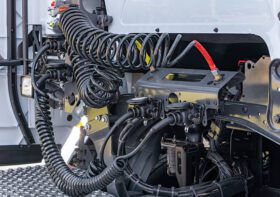Is Your Mitsubishi Running Rough? This Could Be Why

When your car isn’t running how it should, it’s more than just annoying. It messes with your routine, makes every drive feel like a gamble, and could end up costing you far more than it should. If you drive a Mitsubishi and the engine’s acting rough, don’t brush it off. It usually means something’s not right under the bonnet, and the sooner you find out what it is, the easier it is to fix.
Below are some of the most common causes of a rough-running Mitsubishi, with simple explanations that make sense whether you’re car-savvy or not!
Worn-Out Parts? Time to Replace Them
Let’s start with the basics. Engine components like spark plugs, filters, and ignition coils wear out over time. When that happens, your Mitsubishi might start misfiring, idling roughly, or struggling to accelerate. In a lot of cases, the issue clears up quickly once those parts are replaced.
If you’re going to fix it properly, it’s worth getting your hands on the right Mitsubishi car parts in Perth, not just generic substitutes. Using the correct parts designed for your make and model helps everything fit and function the way it’s supposed to, keeping performance high and problems low. It’s a simple fix that can make a big difference.
Dirty Fuel Injectors
Fuel injectors are in charge of spraying petrol into the engine in just the right amount. When they’re clean, they work perfectly. But if they get blocked or gunked up with deposits, you’ll likely feel it while driving.
You might notice the car hesitating when you accelerate, or maybe the engine feels like it’s missing a beat. Sometimes, the idle turns rough or erratic. Bad fuel economy is another red flag. Regular cleaning helps prevent this, but if the injectors are already struggling, replacement could be needed.
Is the Mass Airflow Sensor Playing Up?
This part keeps track of how much air is coming into the engine. Your Mitsubishi then adjusts the fuel mixture based on that information. If the sensor is dirty or failing, the balance goes out of whack. That can cause hesitation, stalling, and rough running, especially when you’re accelerating or starting from cold.
In many cases, a good clean will sort it. But if the sensor’s completely worn, replacing it is the best call.
Vacuum Leaks Can Be Hard to Spot
Your engine relies on vacuum pressure for a few key systems to function properly. When there’s a leak somewhere — maybe a cracked hose or a loose connection — the engine ends up compensating, and that can lead to rough idling and sluggish performance.
You might even hear a slight hissing noise from the engine bay if the leak is large enough. Diagnosing this one can be tricky without the right tools, but a mechanic can usually pinpoint the problem with a quick inspection.
Bad Fuel or Old Petrol Sitting Too Long
This one’s often overlooked, especially if the car has been sitting for weeks without a drive. Fuel that’s old or contaminated won’t burn properly and can mess with performance. It might cause knocking, hesitation, or even stalling.
If you’ve recently filled up at an unfamiliar station or let the tank sit for too long, that could be your issue. Flushing out the tank and topping up with fresh fuel is usually enough. In worse cases, cleaning the fuel system may be needed to get everything back on track.
Failing Oxygen Sensors
These sensors are tucked into the exhaust system and help your car manage fuel mixture by checking how much oxygen is left in the fumes. If they stop working properly, the engine doesn’t get the right signals, and your fuel economy, performance, and emissions all take a hit.
Often, you’ll notice rough running and a drop in power. Sometimes the check engine light pops on too. It’s a relatively inexpensive part to replace, but if ignored, it can lead to bigger engine issues.
Trouble in the Ignition System
If your Mitsubishi’s engine is stuttering or misfiring, the ignition system is a good place to check. When spark plugs, coils, or wires wear out, the engine can’t fire consistently. That leads to a rough idle, hesitation, or difficulty starting the car.
These parts should be checked regularly, especially if your car’s been on the road for a few years. Swapping out a faulty ignition coil or a set of worn spark plugs can bring the engine back to life in no time.
Timing Belt or Chain Issues
The engine’s timing system is all about precision. If the belt or chain slips or stretches, things start happening at the wrong moment. The result? Poor performance, strange engine noises, and a noticeably rough ride.
If left too long, a damaged timing belt can cause serious and expensive engine damage. That’s why it’s important to stick to the recommended timing service intervals. It’s not a cheap job, but it’s far more affordable than repairing a damaged engine.
A Blocked Exhaust Can Slow You Down
When the exhaust system is blocked — usually by a clogged catalytic converter or muffler — it affects how the engine breathes. The build-up of pressure can cause rough idling, poor acceleration, and an overall drop in power.
You might also hear unusual rattling noises underneath the car, especially when it’s idling. Getting the exhaust checked is a smart move. A clear exhaust path helps the engine run freely and reduces stress on internal components.
Smooth Driving Starts with Small Fixes
A rough-running Mitsubishi doesn’t mean it’s time to panic, but it is a signal that something needs attention. Whether it’s a worn part, dirty sensor, or blocked fuel injector, these kinds of problems rarely fix themselves. In fact, ignoring them only gives them more time to turn into something worse.
Start with the basics. Use quality parts when replacing anything. Don’t skip maintenance. And if something feels off, have it checked out sooner rather than later.



